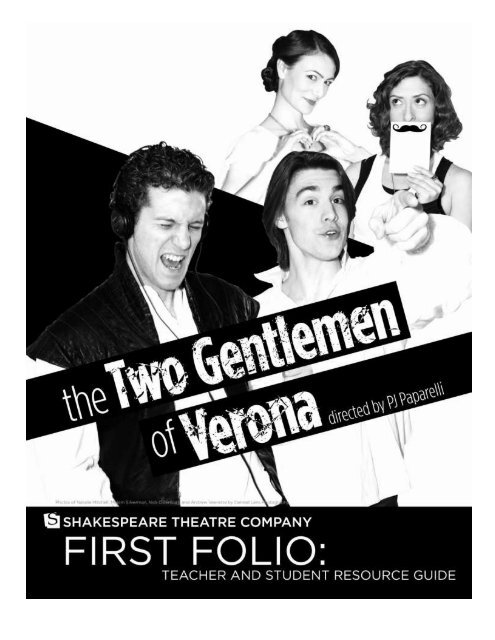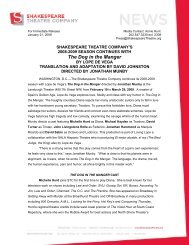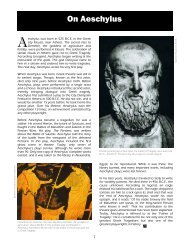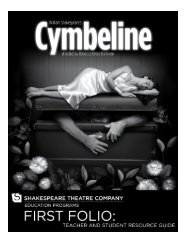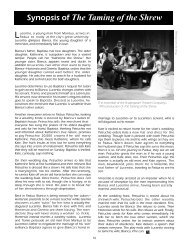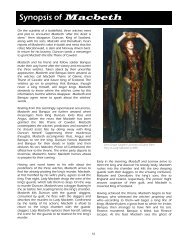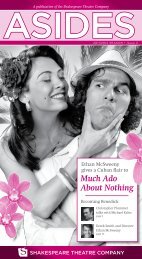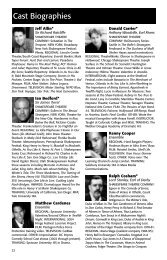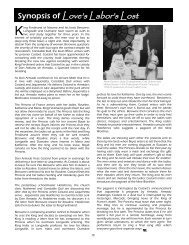The Two Gentlemen of Verona - The Shakespeare Theatre Company
The Two Gentlemen of Verona - The Shakespeare Theatre Company
The Two Gentlemen of Verona - The Shakespeare Theatre Company
Create successful ePaper yourself
Turn your PDF publications into a flip-book with our unique Google optimized e-Paper software.
FIRST FOLIO:<br />
TEACHER AND STUDENT RESOURCE GUIDE<br />
Consistent with the <strong>Shakespeare</strong> <strong>The</strong>atre <strong>Company</strong>‘s central<br />
mission to be the leading force in producing and preserving the<br />
highest quality classic theatre, the Education Department<br />
challenges learners <strong>of</strong> all ages to explore the ideas, emotions<br />
and principles contained in classic texts and to discover the<br />
connection between classic theatre and our modern<br />
perceptions. We hope that this First Folio: Teacher and Student<br />
Resource Guide will prove useful to you while preparing to<br />
attend <strong>The</strong> <strong>Two</strong> <strong>Gentlemen</strong> <strong>of</strong> <strong>Verona</strong>.<br />
First Folio provides information and activities to help students<br />
form a personal connection to the play before attending the<br />
production. First Folio contains material about the playwrights,<br />
their world and their works. Also included are approaches to<br />
explore the plays and productions in the classroom before and<br />
after the performance.<br />
First Folio is designed as a resource both for teachers and<br />
students. All Folio activities meet the ―Vocabulary Acquisition<br />
and Use‖ and ―Knowledge <strong>of</strong> Language‖ requirements for the<br />
grades 8-12 Common Core English Language Arts<br />
Standards. We encourage you to photocopy these articles and<br />
activities and use them as supplemental material to the text.<br />
Enjoy the show!<br />
<strong>The</strong> First Folio Teacher and Student Resource Guide for <strong>The</strong> 2011-2012<br />
Season was developed by the <strong>Shakespeare</strong> <strong>The</strong>atre <strong>Company</strong> Education<br />
Department:<br />
Director <strong>of</strong> Education<br />
Samantha K. Wyer<br />
Audience Enrichment Manager Hannah Hessel<br />
Community Engagement Manager Marcy Spiro<br />
School Programs Manager Vanessa Hope<br />
Training Programs Manager Dat Ngo<br />
Education Coordinator<br />
Tamsin Green<br />
Resident Teaching Artist<br />
Jim Gagne<br />
Master Acting Class Coordinator Jessica Holman<br />
Education Intern<br />
Monica Powell<br />
Table <strong>of</strong> Contents<br />
Synopsis 3<br />
Director‘s Notes 3<br />
Making a Fictional World Look Real 4<br />
Who‘s Who 6<br />
<strong>Shakespeare</strong>‘s Verse & Prose 7<br />
<strong>The</strong> Significance <strong>of</strong> the Ring 9<br />
Who Are the Outlaws 9<br />
Friendship & Love 10<br />
<strong>The</strong> Trials <strong>of</strong> Long Distance 11<br />
Code <strong>of</strong> Honor 12<br />
Post-Performance Discussions 13<br />
That‘s What She Said 13<br />
Resource List 14<br />
<strong>The</strong>atre Etiquette 15<br />
For more information on how you can participate in other <strong>Shakespeare</strong> <strong>The</strong>atre <strong>Company</strong> programs, please<br />
call the Education Hotline at 202.547.5688 or visit <strong>Shakespeare</strong><strong>The</strong>atre.org.<br />
Miles Gilburne and Nina Zolt are founding sponsors <strong>of</strong> the education programs at the <strong>Shakespeare</strong> <strong>The</strong>atre <strong>Company</strong>.<br />
―<strong>Shakespeare</strong> <strong>The</strong>atre <strong>Company</strong>‘s production is<br />
part <strong>of</strong> <strong>Shakespeare</strong> for a New Generation, a<br />
national program <strong>of</strong> the National Endowment for the<br />
Arts in cooperation with Arts Midwest.‖<br />
Support for SHAKESPEARIENCE Student Matinees has also<br />
been provided by<br />
2
<strong>The</strong> <strong>Two</strong> <strong>Gentlemen</strong> <strong>of</strong> <strong>Verona</strong> Synopsis<br />
Valentine and Proteus, two gentlemen <strong>of</strong> <strong>Verona</strong>, are close friends. Contrary to his name, Valentine scorns love and<br />
wishes to be ‗tutor‘d in the world.‘ Proteus, meanwhile, wishes only to remain in <strong>Verona</strong> with his sweetheart, Julia. <strong>The</strong><br />
friends part, Valentine setting <strong>of</strong>f for the court <strong>of</strong> Milan, accompanied by his pageboy Speed.<br />
In <strong>Verona</strong>, Julia, overwhelmed by her emotions for Proteus, berates her servant Lucetta for receiving his love letters and<br />
then turns the knife on herself for ignoring them. When Antonio, Proteus‘ father, orders his son to follow Valentine to the<br />
Duke‘s court in Milan, the two young lovers exchange rings and vows <strong>of</strong> eternal faith. Launce, Proteus‘ servant, is also<br />
forced to leave home, and bids a tearful goodbye to his family before setting sail with his dog, Crab.<br />
In Milan, Valentine arrives and falls instantly in love with Silvia, the daughter <strong>of</strong> the Duke. Proteus arrives soon after and<br />
also forswears his vows—his love for Julia, his friendship for Valentine—by falling for Silvia. Silvia prefers Valentine, but<br />
her father supports Thurio, the wealthier suitor. Unaware <strong>of</strong> Proteus‘ true feelings, Valentine tells him <strong>of</strong> his plan to elope<br />
with Silvia. <strong>The</strong> Duke, informed <strong>of</strong> the plot by Proteus, tricks Valentine into confessing his plan, banishes him from Milan<br />
and assigns Proteus the mission <strong>of</strong> wooing Silvia for Thurio.<br />
Meanwhile, Julia, disguised as a boy, has travelled to Milan to reunite with Proteus. She presents herself to him as<br />
Sebastian the page, and Proteus tasks her with wooing Silvia for his sake. <strong>The</strong> banished Valentine and Speed leave for<br />
Mantua, but a highly selective band <strong>of</strong> Outlaws captures them in the woods and make Valentine their leader. Silvia rejects<br />
the amorous Proteus and escapes Milan, with the help <strong>of</strong> Eglamour, but she is also captured by the Outlaws.<br />
Proteus, pursuing Silvia, fights <strong>of</strong>f the Outlaws and attempts to win her in a frenzy. Shocked at his friend‘s behavior,<br />
Valentine intervenes and a fight ensues. Proteus, suddenly realizing his contemptible actions, begs for forgiveness from<br />
Valentine. Valentine, suddenly magnanimous, pardons Proteus and <strong>of</strong>fers his love in Silvia to his friend. Julia, still<br />
disguised as Sebastian, has been watching all <strong>of</strong> these events and faints. Proteus discovers her identity and, repenting his<br />
inconstancy, returns to his first love. Valentine sets the captured Duke and Thurio free; Thurio backs <strong>of</strong>f his claim to Silvia<br />
and the Duke accepts Valentine as his new son. <strong>The</strong> Outlaws are pardoned for past sins and all return to Milan.<br />
Director’s Notes<br />
By PJ Paparelli<br />
In 2002, I had the privilege to work on Romeo and Juliet at STC. I had just finished<br />
working on a new play about Columbine High School, a project I had been immersed<br />
in for many years. columbinus was about the shooting in 1999, but it was also about<br />
adolescents and their relationships. It was a wonderful theater experiment, to have<br />
these two works bleed into each other. <strong>The</strong> most important thing I learned was that<br />
they were strikingly similar. Teenagers then were very much like teenagers are now.<br />
And now, I have come back to STC and back to a play about very similar things. <strong>The</strong><br />
<strong>Two</strong> <strong>Gentlemen</strong> <strong>of</strong> <strong>Verona</strong> is immensely concerned with the transformative power <strong>of</strong> love, in good ways and<br />
bad ways. It‘s also immensely concerned with young people, wealthy young people (they are ―gentlemen,‖ after<br />
all), young people who are ignored by adults and left to their teenage caprices. One thing I learned years ago is<br />
that teenagers always assume they hold the reigns in their lives. It comes as a sudden and devastating shock<br />
when they discover they are powerless, powerless to control another person‘s actions, powerless to make<br />
someone love them. <strong>The</strong> characters make tremendous choices in this play. And there are no adults around to<br />
guide them. You may think that sounds like Romeo and Juliet – and it does.<br />
And yet, this play isn‘t, like Romeo and Juliet, a tragedy. It‘s unbelievably funny, and it has one <strong>of</strong><br />
<strong>Shakespeare</strong>‘s most famous comic monologues in it. Launce‘s love for his dog, unparalleled in its comedic<br />
possibility, is yet another acute study <strong>of</strong> human behavior. As some <strong>of</strong> you may know, the relationship<br />
between pets and their owners can be mini-dramas played out in real life.<br />
Continued on page 4<br />
3
Director’s Notes (cont.)<br />
<strong>Shakespeare</strong>, who observes the intensity <strong>of</strong> the friendship shared by Proteus and Valentine, is doing the same<br />
thing here. We see Launce, madly in love with his mangy mutt Crab, immersed in his wandering, whimsical,<br />
one-sided conversations. Love makes everyone in this play do crazy things.<br />
<strong>Shakespeare</strong>‘s language expresses all the broiling<br />
emotions and driving passions in this play, and so I<br />
wanted to live in that world as fully as possible.<br />
However, I couldn‘t help but seeing today in this play.<br />
<strong>Two</strong> <strong>Gentlemen</strong> reminds me <strong>of</strong> wealthy suburban<br />
life, where parents are wrapped up in their worries<br />
about the crashing economy and teenagers are left<br />
to their own devices. Our challenge is to allow the<br />
play to exist in its period while also releasing the<br />
energy and the echoes <strong>of</strong> today‘s world.<br />
We have created a hybrid world that is complex, but<br />
ultimately timeless. <strong>The</strong> flavor <strong>of</strong> the costumes is<br />
Elizabethan, as are the class structures. <strong>The</strong>re are<br />
servants and masters, rapiers and farthingales. But<br />
at the same time, product placement suggests the<br />
world that consumes modern teenagers, from<br />
McDonald‘s to Trojan condoms to Apple. <strong>The</strong> images<br />
that you‘ll see in the Lansburgh <strong>The</strong>atre are<br />
fragments <strong>of</strong> the world we live in: busted up,<br />
Next Steps<br />
Common Core Standards: Inference, Analysis and<br />
Evaluation<br />
Why are <strong>Shakespeare</strong>‘s plays are <strong>of</strong>ten set in<br />
different time periods, locations, etc. What do you<br />
think is gained by changing the setting What is<br />
lost<br />
Before seeing our production, how do you think this<br />
contemporary setting will illuminate in the play And<br />
what could potentially be lost<br />
What do you think would happen if adult supervision<br />
no longer existed Do you think you would make<br />
the same choices<br />
dangerous, energetic. I want to have the teenagers <strong>of</strong> today – their recklessness, their abandon, their passions,<br />
their fun – echoing through the design and <strong>Shakespeare</strong>‘s words. I am madly in love with this play, and I would<br />
love to find a way to celebrate <strong>Shakespeare</strong>‘s incredibly modern and observant feel for the passions and<br />
desires <strong>of</strong> the young.<br />
Making a Fictional World Look Real<br />
<strong>The</strong> characters and events depicted in <strong>The</strong> <strong>Two</strong> <strong>Gentlemen</strong> <strong>of</strong> <strong>Verona</strong> exist in a fictional world. So what are<br />
the tricks that directors, designers and actors use to make the world <strong>of</strong> the play look so real Actor Nick<br />
Dillenburg talks about stage combat safety and Lead Props Artisan Chris Young talks about the process <strong>of</strong><br />
creating weapons for the stage.<br />
Nick Dillenburg: <strong>The</strong> most important thing to keep in mind when staging a fight is safety. To that end, I<br />
always try to think <strong>of</strong> it as a "technical exercise." It's easy to get carried away and think <strong>of</strong> it as a fight<br />
and have your own instincts and defense mechanisms kick in, but that's when things can get<br />
dangerous. <strong>The</strong> first couple weeks through the fight it's never really necessary to run it at real<br />
speed. We practice it slowly and with great attention to detail so that it gets "in our bodies." <strong>The</strong>n it's<br />
simply a matter <strong>of</strong> saying to yourself, "I'm not aiming for his nose (my real target), but rather the space<br />
above his shoulder. And because my back is to the audience, I never have the need to get closer than<br />
one to two feet from his face." We're constantly making eye contact with one another so that we know<br />
when kicks and punches are about to arrive, and so we're always on the same page. <strong>The</strong>n, eventually,<br />
you start to bring it up to speed.<br />
Surprisingly, however, the speed at which it translates to an audience is usually slower than how it<br />
would really happen. After all, it always comes back to storytelling.<br />
4<br />
Continued on page 5
Making a Fictional World Look Real (cont.)<br />
Chris Young: Blood knives need to be safe for the actor,<br />
robust enough to last the length <strong>of</strong> the production,<br />
reliable, and easy to clean and reset for the crew. For <strong>The</strong><br />
<strong>Two</strong> <strong>Gentlemen</strong> <strong>of</strong> <strong>Verona</strong> we‘re matching a #2 X-ACTO<br />
knife. <strong>The</strong> medicine dropper will be the reservoir.<br />
<strong>The</strong> blade will be sanded smooth and a layer <strong>of</strong> packing<br />
tape will be applied to it. <strong>The</strong> blade will still be thin after<br />
being dulled, so it will feel sharp. A slot will also be cut<br />
down the middle <strong>of</strong> the blade for the blood to flow<br />
through. <strong>The</strong> screw head that holds the knife blade will<br />
have a 1/16‖ hole drilled though it to allow blood to get to<br />
the blade.<br />
<strong>The</strong> knife body will be drilled out and shortened. It will fit<br />
snugly inside on the medicine dropper. Only the bulb and<br />
about an inch <strong>of</strong> the dropper body will be kept for the rig.<br />
<strong>The</strong> blue plastic will be covered with dark nylon hose. It<br />
will be sized to fit in the actresses hand so no one can<br />
see the bulb.<br />
A manufactured stage blood, ―Reel Blood‖ is used for the<br />
base <strong>of</strong> all <strong>of</strong> the effects. <strong>The</strong> thickness <strong>of</strong> the blood will<br />
be consistent enough so that the actress will be able to<br />
―write‖ in blood on her arm.<br />
Materials used to make the blood knife in<br />
<strong>The</strong> <strong>Two</strong> <strong>Gentlemen</strong> <strong>of</strong> <strong>Verona</strong>.<br />
Actual knife to be used in <strong>The</strong> <strong>Two</strong> <strong>Gentlemen</strong> <strong>of</strong> <strong>Verona</strong>.<br />
5
WHO’S WHO in <strong>The</strong> <strong>Two</strong> <strong>Gentlemen</strong> <strong>of</strong> <strong>Verona</strong><br />
Duke <strong>of</strong> Milan<br />
Silvia‘s father. He wants Silvia to<br />
marry Sir Thurio and banishes<br />
Valentine when he learns <strong>of</strong> his<br />
plans to elope with Silvia.<br />
Thurio<br />
Antonio<br />
Proteus‘ father.<br />
A wealthy man who<br />
competes with Valentine for<br />
Silvia‘s love.<br />
Proteus<br />
Best friends with Valentine and in<br />
love with Julia at the<br />
beginning <strong>of</strong> the play, but then<br />
falls in love with Silvia and tries to<br />
steal her away from Valentine.<br />
Silvia<br />
<strong>The</strong> daughter <strong>of</strong> the<br />
Duke <strong>of</strong> Milan and in<br />
love with Valentine.<br />
Valentine<br />
Proteus‘ best friend and in love<br />
with Silvia. He is banished<br />
after his plans to elope with<br />
Silvia are discovered.<br />
Julia<br />
In love with Proteus. She disguises<br />
herself as a male page named<br />
Sebastian while traveling to Milan to<br />
visit Proteus.<br />
Launce<br />
Proteus‘ witty servant who is<br />
the proud owner <strong>of</strong> his dog<br />
named Crab.<br />
Speed<br />
Valentine‘s page.<br />
KEY<br />
= family<br />
= love<br />
Interest<br />
= friend<br />
= servant<br />
= Lord or<br />
Nobleman<br />
Lucetta<br />
Julia‘s servant who helps<br />
her dress up like the male<br />
page named Sebastian.<br />
6<br />
Outlaws<br />
<strong>The</strong> outlaws find Valentine<br />
after he was banished from<br />
Milan and make him the<br />
leader <strong>of</strong> their group.
<strong>Shakespeare</strong>’s Verse & Prose<br />
During the Elizabethan<br />
period, ―English‖ was a<br />
relatively young language<br />
(only about 160 years old)<br />
combining Latin, French<br />
and Anglo-Saxon. <strong>The</strong>re<br />
was no dictionary or<br />
standardized literacy<br />
education. People in<br />
<strong>Shakespeare</strong>‘s London<br />
spoke much more than<br />
they read, causing the rules <strong>of</strong> grammar and spelling<br />
to be quite fluid. Writers created new words daily and<br />
poets expressed themselves in a new form <strong>of</strong> writing<br />
known as blank verse, first appearing in 1557 in<br />
Certain Bokes <strong>of</strong> Virgiles Aenis by the Earl <strong>of</strong> Surrey:<br />
<strong>The</strong>y whistled all, with fixed face attent<br />
When Prince Aeneas from the royal seat<br />
Thus gan to speak, O Queene, it is thy will,<br />
I should renew a woe can not be told:<br />
(Book II, 1-4)<br />
That the verse was ―blank‖ simply meant that the<br />
poetry did not rhyme, allowing rhyme-less poets such<br />
as Virgil and Ovid to be translated and Elizabethan<br />
playwrights to emulate the natural rhythms <strong>of</strong> English<br />
speech within iambic pentameter.<br />
A typical line <strong>of</strong> verse from this time contains five<br />
units <strong>of</strong> meter or feet. Each foot contains two<br />
syllables. When the first syllable is unstressed and<br />
the second syllable is stressed (dee DUM), it is an<br />
iamb (iambic meaning push, persistency or<br />
determination). <strong>The</strong> prefix penta means five, as in<br />
the five-sided shape—a pentagon. Iambic<br />
pentameter is therefore one line <strong>of</strong> poetry consisting<br />
<strong>of</strong> five forward-moving feet.<br />
It was this new tradition <strong>of</strong> blank verse in iambic<br />
pentameter that <strong>Shakespeare</strong> inherited as he<br />
embarked on his career as playwright and creator <strong>of</strong><br />
the greatest poetry in the history <strong>of</strong> the English<br />
language. Similar to the human heartbeat, a horse<br />
gallop or the beat <strong>of</strong> a piece <strong>of</strong> music, iambic<br />
pentameter drives and supports <strong>Shakespeare</strong>‘s<br />
verse, moving the language along in a forward flow<br />
that emulates the natural speech and rhythms <strong>of</strong> life.<br />
Here is a standard line <strong>of</strong> verse in iambic pentameter<br />
from <strong>The</strong> <strong>Two</strong> <strong>Gentlemen</strong> <strong>of</strong> <strong>Verona</strong>.<br />
I think him so because I think him so.<br />
(act 1, scene 2, line 26)<br />
7<br />
If we were to say the rhythm and not the words, it<br />
would sound like this:<br />
dee DUM dee DUM dee DUM dee DUM dee DUM<br />
When we scan a piece <strong>of</strong> text (marking it with a ―◡‖<br />
for the unstressed and ―/― for stressed), we simply tap<br />
out the rhythm <strong>of</strong> the line, based on dee DUM dee<br />
DUM dee DUM dee DUM dee DUM, to see if the line<br />
is structured in iambic pentameter:<br />
◡ / ◡ / ◡ / ◡ / ◡ /<br />
I think him so because I think him so.<br />
(act 1, scene 2, line 26)<br />
Prose in <strong>Shakespeare</strong>‘s work is not in iambic<br />
pentameter and relies more heavily on other literary<br />
devices for its speed and rhythm. <strong>The</strong>se devices<br />
include: antithesis (setting opposite words against<br />
each other), lists (series <strong>of</strong> actions or descriptive<br />
words that build to a climax) and puns (the use or<br />
misuse <strong>of</strong> a word to mean another word).<br />
<strong>Shakespeare</strong> used prose to express conversation<br />
between the lower classes, like the Mechanicals in A<br />
Midsummer Night’s Dream, or familiar or intimate<br />
scenes, as with Henry and Katherine at the end <strong>of</strong><br />
Henry V. He also utilized prose to express madness<br />
or vulgarity, as in the nunnery scene <strong>of</strong> Hamlet. <strong>The</strong><br />
exact meaning <strong>of</strong> a shift from verse to prose is not<br />
constant, but it always signals a change in the<br />
situation, characters or tone <strong>of</strong> a scene. Only Much<br />
Ado About Nothing and <strong>The</strong> Merry Wives <strong>of</strong> Windsor<br />
rely almost entirely on prose.<br />
In the following passage from <strong>The</strong> <strong>Two</strong> <strong>Gentlemen</strong> <strong>of</strong><br />
<strong>Verona</strong>, Launce speaks in prose.<br />
Lose the tide, and the voyage, and the<br />
master, and the service and the tied! Why,<br />
man, if the river were dry, I am able to fill it<br />
with my tears; if the wind were down, I could<br />
drive the boat with my signs.<br />
(act 2, scene 4, line 50)<br />
As his writing skill level increased, <strong>Shakespeare</strong><br />
gradually employed alliteration (the repetition <strong>of</strong> a<br />
vowel or consonant in two or more words in a<br />
phrase), assonance (resembling vowel sounds in a<br />
line) and onomatopoeia (words with sounds<br />
imitating their meaning) to create deeply poetic,<br />
vibrant images on stage for the characters and his<br />
audience.
Classroom Activities<br />
Common Core Standards: Vocabulary Acquisition and Use, Knowledge <strong>of</strong> Language, Understanding <strong>of</strong><br />
Classical Literature, Questioning and Listening, Analysis and Evaluation<br />
Tackling the Text<br />
Do a close reading <strong>of</strong> a four-or-five-line<br />
passage from <strong>The</strong> <strong>Two</strong> <strong>Gentlemen</strong> <strong>of</strong><br />
<strong>Verona</strong>. Read the lines aloud and<br />
paraphrase them, identifying any<br />
unknown words. Next, identify the<br />
operative words in the passage. Using<br />
the operative words as a starting point<br />
(hint: operatives are always stressed),<br />
scan the lines, using the symbol ―U” for<br />
unstressed and ―/” for stressed, and<br />
determine the meter.<br />
Strategies for Close Reading<br />
When exploring text, it is also helpful to understand<br />
paraphrasing and operative words.<br />
Paraphrasing is a good way <strong>of</strong> making the text more<br />
accessible by putting it in your own words.<br />
Operative words are the words that are essential to<br />
telling the story. <strong>The</strong>y are the most important words in a<br />
line <strong>of</strong> <strong>Shakespeare</strong>‘s text. Operative words are generally<br />
in this order <strong>of</strong> importance: verbs, nouns (including title<br />
and names the first time they are mentioned), adjectives<br />
and adverbs.<br />
<strong>The</strong> Duke in <strong>The</strong> <strong>Two</strong> <strong>Gentlemen</strong> <strong>of</strong> <strong>Verona</strong> speaks in prose. Why would royalty speak in prose<br />
<strong>Shakespeare</strong> used a shift in language as clues to his audience and actors that something was happening.<br />
Do we adjust our language today based on who is in the room, how we are feeling or who we are talking<br />
to Write down an example <strong>of</strong> why a person might shift from verse to prose and prose to verse in 2012.<br />
I Can Do That! Modernizing a Piece <strong>of</strong> Classical Text<br />
See if you can modernize the language in this excerpt from <strong>The</strong> <strong>Two</strong> <strong>Gentlemen</strong> <strong>of</strong> <strong>Verona</strong> without changing<br />
the main ideas that the<br />
characters are discussing. Examine the excerpt line by line and update each line <strong>of</strong> text on its own. Feel free to<br />
look up any words or phrases that you are not familiar with. This activity gives you the opportunity to closely<br />
examine a classical text and recognize how the ideas contained in it are timeless.<br />
Valentine<br />
And why not death rather than living torment<br />
To die is to be banished from myself;<br />
And Silvia is myself: banished from her<br />
Is self from self: a deadly banishment!<br />
What light is light, if Silvia be not seen<br />
What joy is joy, if Silvia be not by<br />
Unless it be to think that she is by,<br />
And feed upon the shadow <strong>of</strong> perfection.<br />
(act 3, scene 1, lines 175-182)<br />
To take it one step further: write your updated version in verse.<br />
8
A Look Inside <strong>The</strong> <strong>Two</strong> <strong>Gentlemen</strong> <strong>of</strong> <strong>Verona</strong><br />
Julia Dion as Julia in STC‘s 2001<br />
production <strong>of</strong> <strong>The</strong> <strong>Two</strong> <strong>Gentlemen</strong> <strong>of</strong><br />
<strong>Verona</strong>. Photo by Carol Rosegg.<br />
<strong>The</strong> Significance <strong>of</strong> the Ring<br />
In <strong>The</strong> <strong>Two</strong> <strong>Gentlemen</strong> <strong>of</strong> <strong>Verona</strong>, Proteus commands Sebastian (Julia, in<br />
disguise) to present Silvia with a ring as a testament <strong>of</strong> his love for her – the<br />
very ring that Julia had given to Proteus as a reminder <strong>of</strong> their love!<br />
<strong>The</strong> giving and receiving <strong>of</strong> rings dates back to the dawn <strong>of</strong> man. While<br />
cavemen didn‘t use rings, they did tie knots <strong>of</strong> grass around their beloved‘s<br />
arms, wrists, ankles and waists to indicate the union <strong>of</strong> two spirits. Ancient<br />
Egyptians also used plants and reeds (such as papyrus and hemp) to fashion<br />
their rings which they believed, like many other ancient civilizations, to<br />
represent eternity as rings are circles with no beginning or end. <strong>The</strong>y were<br />
worn on the third finger <strong>of</strong> the left hand (fourth if you count the thumb), as they<br />
are today – the guiding belief being that the vein running from this finger led<br />
straight to the heart (vena amoris or ―vein <strong>of</strong> love‖). Gems, jewels and<br />
precious metals did not come into play until much later and even then, it had<br />
less to do with one‘s emotional attachment and more to do with one‘s status.<br />
<strong>The</strong> Greeks and Romans adopted the ring tradition with some new cultural and<br />
practical ―advances.‖ <strong>The</strong> rings were now shaped out <strong>of</strong> metals such as bronze<br />
and copper instead <strong>of</strong> reeds and grasses. And no longer were they merely expressions <strong>of</strong> love, but also<br />
signified ―ownership.‖ A woman who accepted and wore the<br />
ring <strong>of</strong> a suitor signified to all other rival suitors that she was<br />
―taken.‖ But these rings also symbolized the woman‘s shared<br />
ownership <strong>of</strong> her husband‘s wealth and property, which was<br />
indicated by its design in the shape <strong>of</strong> a key (though more<br />
romantic types want to believe that it symbolizes the ―key to<br />
one‘s heart‖).<br />
During <strong>Shakespeare</strong>‘s time, the giving and receiving <strong>of</strong> posy<br />
rings were quite popular. Usually made <strong>of</strong> silver, these rings<br />
carried inscriptions with sentiments <strong>of</strong> hope and faith – a<br />
tradition widely practiced today. Eventually, gold became the<br />
standard metal to craft wedding rings out <strong>of</strong> while silver was<br />
reserved for engagement rings.<br />
Next Steps<br />
Who Are the Outlaws<br />
Common Core Standards: Inference,<br />
Analysis and Evaluation<br />
In what other <strong>Shakespeare</strong>an plays are<br />
rings an important symbol<br />
Why in modern times is it common for<br />
men not to have engagement rings<br />
After Valentine is banished from the Duke <strong>of</strong> Milan‘s court he flees to the forest, where he comes across a<br />
merry band <strong>of</strong> outlaws. After an unsuccessful robbery attempt (Valentine assured the men he had nothing to<br />
give but the clothes on his back), Valentine impresses the bandits by claiming that he once killed a man. With<br />
this fact, in addition to his banishment from Milan and his skills as a ―linguist‖, Valentine manages to thoroughly<br />
impress the bandits and they decide to elect him as ―commander and their king.‖ With a bit <strong>of</strong> persuasion,<br />
Valentine humbly accepts his title and becomes their leader, under the condition that they ―do no outrages on<br />
silly women or poor passengers.‖ <strong>The</strong> men, go<strong>of</strong>ily honorable despite their former crimes, assure him that they<br />
―detest such vile base practices.‖<br />
It is likely that <strong>Shakespeare</strong> has borrowed from the popular literary character Robin Hood, the champion <strong>of</strong> the<br />
poor who has been captured in songs, plays and proverbs for hundreds <strong>of</strong> years (It can be certain that<br />
9<br />
Continued on page 10
A Look A Look Inside Inside <strong>The</strong> <strong>The</strong> <strong>Two</strong> <strong>Two</strong> <strong>Gentlemen</strong> <strong>Gentlemen</strong> <strong>of</strong> <strong>of</strong> <strong>Verona</strong> <strong>Verona</strong><br />
Who Are the Outlaws (cont.)<br />
<strong>Shakespeare</strong> was familiar with Robin Hood and his merry<br />
men, as there is a reference to the character by the exiled<br />
duke in As You Like It). Like Valentine and the bandits,<br />
Robin Hood and his men are also inhabitants <strong>of</strong> a forest,<br />
and represent, in various forms, a resistance to authority.<br />
Characters like Robin Hood and Valentine are considered<br />
social bandits; they are gentlemen thrown into their role by<br />
circumstance, and they adhere to a gentleman‘s code.<br />
Valentine‘s rule to do no outrages against women or<br />
defenseless travelers appears on par with Robin Hood‘s<br />
infamous ―Steal from the rich, give to the poor‖ ideology.<br />
While they remain a symbol <strong>of</strong> resistance to an imposed<br />
and oppressive authority in the forest, they are quick to<br />
give up their bandit lifestyle when given the opportunity.<br />
When pardoned by the Duke <strong>of</strong> Milan at the end <strong>of</strong> <strong>Two</strong><br />
Gents, Valentine and the bandits enthusiastically agree to<br />
return to Milan.<br />
Next Steps<br />
Common Core Standards: Inference, Analysis<br />
and Evaluation<br />
In what other <strong>Shakespeare</strong> plays are there<br />
groups <strong>of</strong> people who take in or welcome<br />
those who are banished<br />
Using the outlaws in <strong>Two</strong> <strong>Gentlemen</strong> and the<br />
other examples from <strong>Shakespeare</strong> plays,<br />
answer the following questions: (1) Why do<br />
you think <strong>Shakespeare</strong> included these<br />
characters in the plays (2) How do they help<br />
tell the story<br />
Friendship & Love<br />
When introduced to Proteus and Valentine, we meet them as the best <strong>of</strong> friends. But that soon changes when<br />
Silvia comes into the picture. Proteus falls for Valentine‘s beloved and wastes little time in worrying about his<br />
friend‘s feelings (or those <strong>of</strong> his girlfriend back<br />
home).<br />
In the course <strong>of</strong> one soliloquy (act 2, scene 2),<br />
Proteus not only justifies his love for Valentine‘s<br />
girl, Silvia, but also announces his intentions to<br />
throw his old friend ―under the bus‖ to obtain the<br />
object <strong>of</strong> his affection. If there was any pause, it<br />
was short-lived and easily dismissed:<br />
To love fair Silvia, shall I be forsworn;<br />
To wrong my friend, I shall be much forsworn;<br />
And even that power which gave me first my oath<br />
Provokes me to this threefold perjury;<br />
Love bade me swear and Love bids me forswear.<br />
Is this not a gross violation <strong>of</strong> ―guy code‖ Or is<br />
all truly fair in love as it is in war<br />
Donald Corren as Speed, Floyd King as Launce and Sydney as Crab in<br />
STC‘s 2001 production <strong>of</strong> <strong>The</strong> <strong>Two</strong> <strong>Gentlemen</strong> <strong>of</strong> <strong>Verona</strong>. Photo by Carol<br />
Rosegg.<br />
It would certainly seem so to Valentine who, when all is said and done, remains the most loyal <strong>of</strong> friends. Not<br />
only does Valentine bear no grudge against Proteus for his treachery, but he also <strong>of</strong>fers up Silvia to preserve<br />
their friendship. In Valentine‘s case, loyalty to his male friend supersedes any vows made to Silvia.<br />
Surely Valentine‘s loyalty towards Proteus insults our modern sensibilities, right Or does it…<br />
10<br />
Continued on page 11
A Look Look Inside Inside <strong>The</strong> <strong>The</strong> <strong>Two</strong> <strong>Two</strong> <strong>Gentlemen</strong> <strong>Gentlemen</strong> <strong>of</strong> <strong>Verona</strong> <strong>of</strong> <strong>Verona</strong><br />
Friendship & Love (cont.)<br />
Valentine‘s love for Proteus trumping that <strong>of</strong> his love for Silvia would not have seemed that strange to an<br />
Elizabethan audience. As evidenced in writings from ancient Palestine, Greece and Rome, male friendships<br />
were seen as nobler than marital bonds. Greek and Roman myth further support this notion as heterosexual<br />
love frequently led to danger while male friendship was celebrated as the source <strong>of</strong> strength and inspired<br />
heroic deeds as seen in Achilles‘ relationship with Patroclus versus his devotion to Briseis.<br />
Even in contemporary literature, one still sees the celebration <strong>of</strong> male friendship and its dominance over any<br />
heterosexual relationship (Ishmael and Queequeg in Melville‘s Moby Dick, George and Lennie in Steinbeck‘s<br />
Of Mice and Men and Sal and Dean in Kerouac‘s On the Road). Outside <strong>of</strong> literature, one can look at the<br />
relationships amongst the cast members <strong>of</strong> MTV‘s Jersey Shore in which the males always remain loyal to one<br />
another and demonstrate ―guy code‖, regardless <strong>of</strong> how the females are affected by their actions.<br />
Are these beliefs truly a thing <strong>of</strong> the past or do we still put friends before significant others<br />
Classroom Activity<br />
Common Core Standards: Inference, Persuasive Writing, Analysis and Evaluation<br />
<strong>The</strong> Trials <strong>of</strong> Long Distance<br />
At the very beginning <strong>of</strong> the play Proteus is very much in love with Julia, saying ―He after honor hunts, I after<br />
love . . . . He leaves his friends to dignify them more:/I leave myself, my friends, and all, for love‖ (act 1, scene<br />
1, 66-68). By the end <strong>of</strong> the play, he has dismissed Julia and has become infatuated with Silvia, even<br />
threatening ―I‘ll force thee yield to my desire‖ (act 5, scene 4, line 64).<br />
Although his actions are not excusable, the issue <strong>of</strong> distance might have contributed to his change <strong>of</strong> heart. By<br />
21st century standards, the distance between <strong>Verona</strong> and Milan is 100 miles, less than the distance from<br />
Washington, DC, to Philadelphia, PA. Today we have technological tools at our disposal to help bridge long<br />
distances, but back then being separated by more than a few miles meant it could take months to<br />
communicate. Being in any long distance relationship has its challenges; imagine how much more difficult it<br />
would be when there is no opportunity to immediately contact your loved one.<br />
1. Below is a list <strong>of</strong> ways to communicate with people. Rank them by your personal communication<br />
preference: Call, text, email, Facebook, Twitter, Skype, IM, letters, postcards, in person.<br />
2. Imagine you only had access to the forms <strong>of</strong> communication available at the time <strong>Shakespeare</strong> was<br />
writing <strong>The</strong> <strong>Two</strong> <strong>Gentlemen</strong> <strong>of</strong> <strong>Verona</strong> in the 1600s. How would this affect your communication with<br />
your friends and family Would you keep in contact with the same people as you do now Would<br />
you communicate the same information<br />
3. Given the difficulties <strong>of</strong> long-distance communication in the 1600s, how do you think audiences<br />
reacted to Proteus‘ behavior at the time<br />
4. Given that our production uses modern forms <strong>of</strong> communication, how does that affect your reaction<br />
to Proteus‘ behavior<br />
11
A Look Inside <strong>The</strong> <strong>Two</strong> <strong>Gentlemen</strong> <strong>of</strong> <strong>Verona</strong><br />
Classroom Activity<br />
Common Core Standards: Argument and persuasive writing, Listening, Performance<br />
Code <strong>of</strong> Honor<br />
<strong>The</strong> <strong>Two</strong> <strong>Gentlemen</strong> <strong>of</strong> <strong>Verona</strong> follows the friendship <strong>of</strong> Valentine and Proteus. At times they appear to be the<br />
best <strong>of</strong> friends with undying loyalty and yet there are some cracks in their friendship. Looking at their<br />
relationship brings forward questions about the role we play in our friend‘s lives. Is there an un<strong>of</strong>ficial honor<br />
code that we should follow<br />
<strong>The</strong> actor playing Proteus shares reflections on how the play rings true with his memories <strong>of</strong> teenage<br />
friendships:<br />
―I can easily identify with Proteus' situation. He's in love for the first time and has the misfortune <strong>of</strong><br />
having these feelings before his good friend. <strong>The</strong> general sentiment among the guys I played football<br />
with in high school was ‗bros before hoes.‘ And as coarse as that sounds, I was always so concerned<br />
with what other people thought that it affected me.<br />
In the play, Valentine is giving Proteus a hard time for having fallen in love with Julia, and the main way<br />
these guys express themselves to each other is through sarcasm and insult. <strong>The</strong>y rarely channel their<br />
feelings directly, for fear <strong>of</strong> insult. And then Proteus fears even to tell his father, which doesn't turn out<br />
well either. Left to his own thoughts Proteus wants to punch a wall. I can remember a couple <strong>of</strong> times<br />
when I actually did!<br />
Those were some <strong>of</strong> the best and worst times <strong>of</strong> my life, coming upon these emotions and situations for<br />
the first time. Falling in love, having a best friend, feeling on top <strong>of</strong> the world because your football<br />
team was going to the state tournament. I felt untouchable until proven otherwise. I can also<br />
remember the fallout when my best friend suddenly had a girlfriend with whom he spent all his time and<br />
I was left out in the cold, feeling forgotten. It may seem a little dramatic, but back then that was my<br />
whole world.‖<br />
Discussion Questions<br />
What are the dos and don‘ts in friendship If push came to shove, whom should you be more loyal to – your<br />
best friend who you‘ve known since kindergarten or your new boy/girlfriend whom you only recently started<br />
dating<br />
What are the rules governing interaction between your best friend and your significant other What<br />
happens if you fall in love with your friend‘s significant other<br />
Individual Activity: Brainstorm a list <strong>of</strong> statements beginning with ―I pledge to…‖ that defines the ideal conduct<br />
<strong>of</strong> a friend. Write these down and share and discuss with your classmate why you believe these traits are<br />
important.<br />
Group Activity Option: Ask four volunteers (<strong>of</strong> same or different gender) to seat themselves in a row in front<br />
<strong>of</strong> the class. Ask each person to take turns making ―I pledge‖ statements. Each statement should be presented<br />
as a vow that one would adhere to in friendship (for example, ―I pledge to always tell the truth to my best<br />
friend‖). Circumvent any anxiety by encouraging them to be honest and spontaneous and asking the rest <strong>of</strong> the<br />
class to withhold any vocal judgment during the activity. Each participant should make one ―I pledge‖ statement<br />
and then the next person in line will make an original ―I pledge‖ statement.<br />
This process repeats for several rotations so that each participant has <strong>of</strong>fered different statements. Follow this<br />
activity with a group discussion: what did you agree/disagree with What informed each statement Were<br />
some in response to others<br />
12
A Look Inside <strong>The</strong> <strong>Two</strong> <strong>Gentlemen</strong> <strong>of</strong> <strong>Verona</strong><br />
Classroom Activities<br />
Common Core Standards: Inference, Persuasive Writing, Analysis and Evaluation<br />
Post-Performance Discussion Questions<br />
After seeing our production <strong>of</strong> <strong>The</strong> <strong>Two</strong> <strong>Gentlemen</strong> <strong>of</strong> <strong>Verona</strong>, and rereading<br />
director, PJ Paparelli‘s notes (found on page 3), answer the<br />
following questions.<br />
Was our production an accurate depiction <strong>of</strong> young people‘s lives<br />
Did you see any stereotypes <strong>of</strong> young people If so, what were they<br />
and why were they stereotypes<br />
Should adults stop trying to portray young people‘s lives<br />
Some <strong>of</strong> the characters are dealing with difficult situations and<br />
problems. Do you think that they dealt with them correctly What advice<br />
would you give to them<br />
What do you think was illuminated in the play with this setting What<br />
was lost<br />
Costume rendering by Paul Spadone.<br />
That’s What She Said<br />
In the final scene <strong>of</strong> <strong>Two</strong> Gents, act 5, scene 4, Proteus forces<br />
himself on Silvia, Valentine catches him, forgives him and Proteus<br />
agrees to marry Julia. It is because <strong>of</strong> this final scene that many<br />
people consider <strong>The</strong> <strong>Two</strong> <strong>Gentlemen</strong> <strong>of</strong> <strong>Verona</strong> to be a ―problem<br />
play.‖ Not only are the women passed around like objects, but<br />
neither <strong>of</strong> them speak in the last two pages— their fate is decided<br />
for them by the men. Four hundred years ago, Julia and Silvia<br />
might not have felt comfortable speaking up for themselves, but if<br />
this same scene played itself out in 2012, it would most likely end<br />
very differently.<br />
Picture yourself in Julia or Silvia‘s shoes, watching these two men<br />
decide your fate. What would you say to them What actions<br />
would you have taken Would Julia still forgive Proteus Would<br />
Silvia be angry at Valentine when he gave her away to Proteus<br />
Write lines for Julia and Silvia to add into this scene.<br />
After each person has written their additional lines, split up into<br />
groups and assign each person a character and add in your lines<br />
for Sylvia and Julia. How do these lines affect the ending <strong>of</strong> the<br />
play<br />
Costume rendering by Paul Spadone.<br />
13
Resource List<br />
<strong>Shakespeare</strong> Dictionaries<br />
Schmidt, Alexander. <strong>Shakespeare</strong> Lexicon and Quotation Dictionary. Dover, 1971.<br />
Onion, C.T. A <strong>Shakespeare</strong> Glossary. Oxford University Press, 1986.<br />
Books on <strong>Shakespeare</strong><br />
Asimov, Isaac. Asimov’s Guide to <strong>Shakespeare</strong>. Doubleday, 1978.<br />
Cahn, Victor L. <strong>The</strong> Plays <strong>of</strong> <strong>Shakespeare</strong>: A <strong>The</strong>matic Guide. Greenwood Press, 2001.<br />
Epstein, Norrie. <strong>The</strong> Friendly <strong>Shakespeare</strong>. Penguin Books, 1993.<br />
Fallon, Robert Thomas. A <strong>The</strong>atregoer’s Guide to <strong>Shakespeare</strong>. Ivan M. Dee, 2001.<br />
Gibson, Janet and Rex Gibson. Discovering <strong>Shakespeare</strong>’s Language. Cambridge University Press, 1999.<br />
Greenblatt, Stephen. Will in the World. W.W. Norton, 2004.<br />
Holmes, Martin. <strong>Shakespeare</strong> and His Players. Charles Scribner's Sons, 1972.<br />
Kermode, Frank. <strong>Shakespeare</strong>’s Language. Allen Lane, <strong>The</strong> Penguin Press, 2000.<br />
Linklater, Kristin. Freeing <strong>Shakespeare</strong>’s Voice. <strong>The</strong>atre Communications Group, 1992.<br />
McDonald, Russ. <strong>The</strong> Bedford Companion to <strong>Shakespeare</strong>: An Introduction with Documents.<br />
Bedford Books <strong>of</strong> St. Martin‘s Press,1996.<br />
Pritchard, R. E. <strong>Shakespeare</strong>’s England. Sutton Publishing Limited, 1999.<br />
Papp, Joseph and Elizabeth Kirkland. <strong>Shakespeare</strong> Alive. Bantam Books, 1988.<br />
Books on Teaching <strong>Shakespeare</strong><br />
Gibson, Rex. Teaching <strong>Shakespeare</strong>. Cambridge University Press, 1998.<br />
Reynolds, P. Teaching <strong>Shakespeare</strong>. Oxford University Press, 1992.<br />
Rosenblum, Joseph. A Reader's Guide to <strong>Shakespeare</strong>. Salem Press, Inc., 1998.<br />
Toropov, Brandon. <strong>Shakespeare</strong> for Beginners. Writers and Readers Publishing Inc., 1997.<br />
Websites<br />
<strong>Shakespeare</strong> <strong>The</strong>atre <strong>Company</strong>—http://www.shakespearetheatre.org/education<br />
ON SHAKESPEARE: Articles and information about <strong>Shakespeare</strong>‘s life and world<br />
In Search <strong>of</strong> <strong>Shakespeare</strong>: <strong>Shakespeare</strong> in the Classroom—http://www.pbs.org/shakespeare/educators/<br />
<strong>The</strong> companion website to Michael Wood‘s four-part PBS series In Search <strong>of</strong> <strong>Shakespeare</strong>, this site<br />
includes extensive research about <strong>Shakespeare</strong>‘s life and works, as well as interactive features.<br />
Folger <strong>Shakespeare</strong> Library—http://www.folger.edu<br />
Includes excellent resources for further reading about <strong>Shakespeare</strong>, as well as fun games and<br />
information designed specifically for students and teachers.<br />
Standards <strong>of</strong> Learning<br />
<strong>The</strong> activities and question sequences found in the Folio supports grade 8-12 Common Core standards in<br />
English Language Arts. Primary content areas addressed include but are not limited to:<br />
Understanding <strong>of</strong> Classical Literature<br />
Vocabulary and Content Development<br />
Stagecraft<br />
Argument and Persuasive Writing<br />
Inference<br />
Performance<br />
Questioning and Listening<br />
Research<br />
Analysis and Evaluation<br />
14
<strong>The</strong> phrase “theatre etiquette” refers to<br />
the special rules <strong>of</strong> behavior that are called<br />
for when attending a theatre performance.<br />
Above all, it is important to remember that<br />
the actors on stage can see and hear you<br />
at the same time you can see and hear<br />
them. Be respectful <strong>of</strong> the actors and your<br />
fellow audience members by being attentive<br />
and observing the general guidelines<br />
below:<br />
Before you go:<br />
<strong>The</strong>atre Etiquette<br />
Please remember to turn <strong>of</strong>f all<br />
electronic devices (iPods, games,<br />
etc.). It can be very distracting, not<br />
to mention embarrassing, when a Students at a SHAKESPEARIENCE production <strong>of</strong> Cymbeline.<br />
cell phone goes <strong>of</strong>f during a<br />
Photo by Nicole Geldart.<br />
performance. <strong>The</strong> lights from cell<br />
phones and other electronic devices are also a big distraction, so please no text messaging.<br />
We‘re sure that you would never stick your gum underneath your chair or spill food and drinks, but<br />
because this theatre is so new and beautiful, we ask that you spit out your gum before entering the<br />
theatre and leave all food and drinks in the lobby or the coat check.<br />
We don‘t want you to miss out on any <strong>of</strong> the action <strong>of</strong> the play, so please visit the restroom before the<br />
performance begins.<br />
During the performance:<br />
Please feel free to have honest reactions to what is happening on stage. You can laugh, applaud and<br />
enjoy the performance. However, please don‘t talk during the performance; it is extremely distracting to<br />
other audience members and the actors. Save discussions for intermission and after the performance.<br />
Thoughts about the importance <strong>of</strong> being an audience<br />
member from <strong>Shakespeare</strong> <strong>The</strong>atre <strong>Company</strong> Artistic<br />
Director Michael Kahn<br />
―When you go to the theatre, you are engaging with other living, breathing human<br />
beings, having an immediate human response. In the theatre you sense that all <strong>of</strong><br />
this may never happen again in this particular way.<br />
As a member <strong>of</strong> the audience, you are actually part <strong>of</strong> how that‘s developing—you<br />
have a hand in it … You are part <strong>of</strong> a community where you are asked to be<br />
compassionate, perhaps to laugh with or grieve as well as to understand people,<br />
lives and cultures different from your own.‖<br />
15


